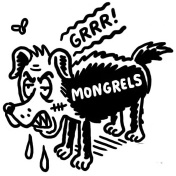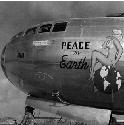|
Frostwerks posted:And maybe more? Way more, really. But again, it didn't much matter because the war that actually got fought was very different than the Mexican-American War, which is what most of the theory crafting prior to the war was based on. PittTheElder fucked around with this message at 02:54 on Dec 19, 2013 |
|
|
|

|
| # ? Jun 11, 2024 14:39 |
|
What was the Mex-Am war like, anyway? In tech terms it's still muskets more than rifle-muskets, right? And it was basically a force of US regulars against generally-subpar militiamen with a few really professional units mixed in? And of course Los San Patricios.
|
|
|
|
The South was definitely drinking it's own Kool-Aid, but at the end of the day war was the only option. Slaves were the largest source of wealth in the country. Bigger than the railroads or industry. Freeing them voluntarily would be like everyone burning their house deeds today. There was no scenario where this was going to end peacefully. Here's an interesting site if anyone is interested in viewing slavery from an economic perspective. http://www.measuringworth.com/slavery.php Among the more interesting notes, the average price of a slave was 4 times the average per capita income. Owning a slave was the financial equivalent of buying a house.
|
|
|
|
Grand Prize Winner posted:What was the Mex-Am war like, anyway? In tech terms it's still muskets more than rifle-muskets, right? And it was basically a force of US regulars against generally-subpar militiamen with a few really professional units mixed in? The Mex-Am war is a hobby horse of mine. I'll get in an effort post on this soon (Winter Break is on tap for me), but for now: 1) It was hell on earth. The casualties from disease and desertion were at least as bad as the Civil War, and most of the time worse. 2) It was, more than even wars against Native Americans, tinged with creepy racial and religious overtones. Only the Span/Phil-Am war is remotely close to it in this regard. 3) It was, more than any war until Vietnam, deeply divisive at home and among the communities the soldiers came from. 4) It was fought with politics on the brain, and many questionable or even terrible military decisions that killed men and put them in danger were made politically. 5) It was begun, ended and fought with deep duplicity even beyond the old story we all know about the mobile borders of Texas. 6) The actual fighting alternated between open-field slaughter of under-equipped, morale-deficient Mexican soldiers and militias, siege wafare of towns and redoubts, and terrible bloodlettings resulting from the storming of towns and redoubts or the long, slow process of hunting down irregular Mexican fighters.
|
|
|
|
Krispy Kareem posted:The South was definitely drinking it's own Kool-Aid, but at the end of the day war was the only option. Slaves were the largest source of wealth in the country. Bigger than the railroads or industry. Freeing them voluntarily would be like everyone burning their house deeds today. There was no scenario where this was going to end peacefully. There was absolutely no reason for them to start the war, however. Lincoln and the Republicans had no plans to interfere with slavery where it already existed, they wanted to prevent its spread into Kansas and other Western territories that were generally unfit for slavery anyway. The South did have a long term concern that it wouldn't be able to annex Cuba and parts of Central America/Mexico and spread slavery there like it wanted, or a long-term imbalance in the Senate, but the only way by which slavery could have been ended in the short term in the 1860s was by the South starting a war over it.
|
|
|
|
Krispy Kareem posted:Among the more interesting notes, the average price of a slave was 4 times the average per capita income. Owning a slave was the financial equivalent of buying a house. More accurately, it was the equivalent of buying a piece of factory equipment. A slave was both things, though -- they appreciated in value like an investment in houses or land or stocks, they produced additional value through their labor like equipment or wage labor, and they self-reproduced if you were careful, magnifying both of the first two qualities immensely. Slavery's terrible economic logic was tremendously powerful.
|
|
|
|
BrotherAdso posted:The Mex-Am war is a hobby horse of mine. I'll get in an effort post on this soon (Winter Break is on tap for me), but for now: Holy poo poo, that sounds eerily similar the other wars Americans don't really talk about.
|
|
|
|
PittTheElder posted:Also, in the secession of 1860/1 the confederate states deliberately rushed in, knowing full well they hadn't had time to plan. Many of the hardest core secessionists remembered quite well the events of 1850, when South Carolina was demanding to secede in the face of the Wilmot Provisio (banning slavery in the Mexican Cession). Secessionist cliques had formed up (in more than just South Carolina I believe), but they decided to wait it out and see what the compromise being worked out in Congress would look like. Eventually the fervor passed, the Compromise of 1850 became a thing, and the hardcore secessionists weren't happy. When 1860 came around, they were determined to get the ball rolling this time around, and see what the future brought. In the lead up to secession, between the election and the swearing-in, there was also a lot of skullduggery going on to shift things in the South's favor. Depots of arms being shifted south, ships being rebased, that sort of thing. Fortunately, Edwin Stanton (the democratic Buchanan admin attorney general and future Lincoln admin war secretary) noticed and coordinated a secret campaign to stop the transfers, going so far as to write secret letters to Lincoln's faction in the Republican party to get their help. The outcome probably wouldn't have changed, but that many more arms ending up in the South would have made the early war more bloody for sure.
|
|
|
|
Rogue0071 posted:There was absolutely no reason for them to start the war, however. Lincoln and the Republicans had no plans to interfere with slavery where it already existed, they wanted to prevent its spread into Kansas and other Western territories that were generally unfit for slavery anyway. The South did have a long term concern that it wouldn't be able to annex Cuba and parts of Central America/Mexico and spread slavery there like it wanted, or a long-term imbalance in the Senate, but the only way by which slavery could have been ended in the short term in the 1860s was by the South starting a war over it. Well, the Northern Abolitionist crowd was pretty sure that if they could contain slavery, they could eventually end it, though eventually was always a long way (decades or more) away. Pro-Slavery Southerners seemed to buy into the idea, and they had also convinced themselves that slavery was a positive good for all concerned anyway. So any containment of slavery was completely unacceptable.
|
|
|
|
Grand Prize Winner posted:Holy poo poo, that sounds eerily similar the other wars Americans don't really talk about. Yeah, how much does the occupation of the Philippines (the Philippine War) come up in general discussion?
|
|
|
|
Grand Prize Winner posted:Holy poo poo, that sounds eerily similar the other wars Americans don't really talk about. Speaking of which, here's something I made a while back. It's an Excel file where each row is one calendar year, and in the columns it shows what wars the US was engaged in during those years. Maybe I should pretty it up someday, and link to the wiki articles for each. http://sdrv.ms/11AFUJQ Tell me if the link doesn't work. Also, I'm not sure which revision you'll see. There's one with a whole bunch of colors, and another with only 4. I think that link goes to the 4 color one, but I've had it send me to both. (I need to get better file hosting) The TLDR version is: The US has had a total of nine calendar years since the Revolution in which it was not overtly engaged in military action somewhere. (Not counting secret CIA bullshit, of course; and not counting Cold War troops sitting on their asses in Korea and Germany) Only two of those were since the Civil War, both of them were under Carter. WIMP.
|
|
|
|
PittTheElder posted:Well, the Northern Abolitionist crowd was pretty sure that if they could contain slavery, they could eventually end it, though eventually was always a long way (decades or more) away. Pro-Slavery Southerners seemed to buy into the idea, and they had also convinced themselves that slavery was a positive good for all concerned anyway. So any containment of slavery was completely unacceptable. It's important to differentiate between anti-slavery and abolitionist Northerners here. Abolitionists were a tiny and radical minority and, by and large, did not believe in containment as a strategy to defeat slavery; while it was obviously better than nothing most abolitionists believed that you would need some sort of direct attack on slavery. In the case of some, like John Brown, this meant a direct military assault with the hope of creating a slave uprising; for others (Garrison et al) it meant moral persuasion of slaveowners to abandon slavery, but regardless it meant confronting slavery in the states where it existed. Anti-slavery advocates and politicians, like most of the Republican party, had a variety of reasons for supporting the containment of slavery. Some, like Lincoln, did believe that containing slavery would kill it. Many did not care particularly about slavery in the South, but resented infringements on their personal liberties (the Gag Rule and 1850 Fugitive Slave Act particularly) that came from slavery and feared that a slave power intended to establish slavery everywhere across the nation. Most felt that the expansion of slavery to the Western territories would infringe on the possibilities and opportunities for free white labor, in some cases this meant opposing the expansion of slavery because the West should be preserved exclusively for white settlers and blacks should not be allowed West even as slaves. Indiana and Illinois actually banned the entrance of blacks to their states as part of this attitude. As for Southern pro-slavery advocates, most of them, even firebrands like James Henry Hammond initially recognized that slavery in Kansas was a preposterous notion geographically speaking and thought that the South should focus on acquiring land actually suited for slavery such as Cuba or Mexico. However, once the question of slavery in Kansas and the territories was raised, it became a matter of Southern honor to press the issue, and honor culture did not permit a respectable person to back down from such a clash. In addition, pro-slavery fire-eaters devised an argument by which since slaves were property, they should have the right to bring their property anywhere in the nationally-held territories. This perspective was reinforced by the Supreme Court's decision in Dred Scott, and the potential solution offered by Stephen Douglas's Popular Sovereignty was rendered unworkable when Douglas was forced by Lincoln to concede, when questioned as to how under Dred Scott a territory could abolish slavery, that slavery required a legal code to exist and a territory could choose to make slavery impossible by refusing to establish such a code. In response, the fire-eater argument incorporated a demand for a national slave code in the territories which was unacceptable to the Republicans and other anti-slavery forces. quote:Yeah, how much does the occupation of the Philippines (the Philippine War) come up in general discussion? I don't believe I have ever heard reference to the Philippine War outside of history classes or discussions of imperialism with other socialists. Rogue0071 fucked around with this message at 07:59 on Dec 19, 2013 |
|
|
|
Ardennes posted:Yeah, how much does the occupation of the Philippines (the Philippine War) come up in general discussion? I've seen the war mentioned a whopping one time by a professor.
|
|
|
|
Ardennes posted:Yeah, how much does the occupation of the Philippines (the Philippine War) come up in general discussion? My APUSH teacher described Aguinaldo as "Jefferson and Washington and Franklin rolled into one" and the occupation soldiers as human trash, so there's that
|
|
|
|
VideoTapir posted:and not counting Cold War troops sitting on their asses in Korea and Germany) Those aren't even on the fringes of being considered forward military posts. Those bases are literally no different than any fort in the US. They train and they deploy in rotations with units in the states. Bases there just allow easier response time to incidents that might happen on the side of the earth where the majority of its population lives, a different variety of training environments, and it's mutually beneficial with our allies that host them. It's not like troops there have any kind of special cold war deterrent purpose they only exist to serve. I realize this is all only tangentially related to your point, but after having been stationed in Alaska, it's become a pet peeve of mine when people look at that era of bases through a 50 year old lens when things have changed so dramatically since then. Volkerball fucked around with this message at 12:34 on Dec 19, 2013 |
|
|
|
Volkerball posted:Those aren't even on the fringes of being considered forward military posts. Those bases are literally no different than any fort in the US. They train and they deploy in rotations with units in the states. Bases there just allow easier response time to incidents that might happen on the side of the earth where the majority of its population lives, a different variety of training environments, and it's mutually beneficial with our allies that host them. It's not like troops there have any kind of special cold war deterrent purpose they only exist to serve. I realize this is all only tangentially related to your point, but after having been stationed in Alaska, it's become a pet peeve of mine when people look at that era of bases through a 50 year old lens when things have changed so dramatically since then. During the Cold War, US military bases around the world were important for the same reasons (training, coordination with allies, logistics, etc.), weren't they? Sounds like pretty much the same lens, even if the enemies are different today.
|
|
|
|
Vivian Darkbloom posted:During the Cold War, US military bases around the world were important for the same reasons (training, coordination with allies, logistics, etc.), weren't they? Sounds like pretty much the same lens, even if the enemies are different today. Yes and no. The ones I'm referring to were placed in countries that were defeated in wars or built specifically to be close to Russia. They were different than the old bases in the US in that regard, as they had a role as an outpost to project force in the immediate surrounding area. Those old purposes have kind of phased out as the world has progressed, and now those bases are basically indistinguishable in their intent from any military base in the US. They're just in other countries.
|
|
|
|
Jerry Manderbilt posted:My APUSH teacher described Aguinaldo as "Jefferson and Washington and Franklin rolled into one" and the occupation soldiers as human trash, so there's that I wonder how much US invention in Central America and the Caribbean before ww2 (much less after) comes up on the test. We occupied Haiti for 19 years from 1915 to 1934 and we had marines stationed in Nicaragua for about 24 years after a US backed coup, including actively occupying Nicaraguan cities.
|
|
|
|
Jerry Manderbilt posted:My APUSH teacher described Aguinaldo as "Jefferson and Washington and Franklin rolled into one" and the occupation soldiers as human trash, so there's that The Philippines War is not my strong point, but that seems a little misleading even if understandable. Its important to realize that Aguinaldo was a controversial figure at the time disliked by many of the lower classes. Aristocratic and elitist, his leadership actually drove a substantial number of people into providing manpower for U.S. military operations. It was in many respects, a civil war as well as anti-American insurgency. It was also politics. While U.S. forces committed numerous atrocities, its also worth noting that a number of these were outright fabricated by the well-meaning but ultimately deceiving anti-imperialists. This is why some massacre accounts reference units that never actually existed. I simply can not reduce thousands into "human trash" without taking into account the powerful social forces at work. I question this term as it places a majority of blame on one group of soldiers, while ignoring that the racist, nationalist society of the United States and Europe was responsible more than anything else. Above all else, the Philippines must not be mistaken to have a nationalist identity during this period; many hated the US occupation, but others celebrated it. The study of colonial and imperial conflicts is made difficult by false assumptions of national identity or resistance among the oppressed.
|
|
|
|
Volkerball posted:Those aren't even on the fringes of being considered forward military posts. Those bases are literally no different than any fort in the US. They train and they deploy in rotations with units in the states. Bases there just allow easier response time to incidents that might happen on the side of the earth where the majority of its population lives, a different variety of training environments, and it's mutually beneficial with our allies that host them. It's not like troops there have any kind of special cold war deterrent purpose they only exist to serve. I realize this is all only tangentially related to your point, but after having been stationed in Alaska, it's become a pet peeve of mine when people look at that era of bases through a 50 year old lens when things have changed so dramatically since then. I was stationed in Korea. (And I'm FROM Alaska) The bases north of Seoul, particularly in the 60s and 70s, are different from any fort in the US (and that manifests in the tree cutting incident), but otherwise, pretty much. The one I was stationed at (Osan), apart from the quarterly-or-more chem warfare exercises, pretty much wasn't. That's why I wasn't counting them. Edit: http://en.wikipedia.org/wiki/Axe_Murder_Incident VideoTapir fucked around with this message at 01:34 on Dec 20, 2013 |
|
|
|
Ardennes posted:I wonder how much US invention in Central America and the Caribbean before ww2 (much less after) comes up on the test. We occupied Haiti for 19 years from 1915 to 1934 and we had marines stationed in Nicaragua for about 24 years after a US backed coup, including actively occupying Nicaraguan cities. The test varies by year but for possible content we definitely covered the Cuban occupation and the terms we dictated to them after the Spanish-American War.
|
|
|
|
computer parts posted:The test varies by year but for possible content we definitely covered the Cuban occupation and the terms we dictated to them after the Spanish-American War. The AP USH was a lot better than most state curriculum from what I found but it was still obviously wanting. That said, most of the real good stuff about American history isn't taught in American history classes (including undergrad) but is found in other fields, Latin American history, Modern European, Soviet/Russian history etc.
|
|
|
|
Marlows posted:
Here is an excerpt from one letter up on the wikipedia page: http://en.wikipedia.org/wiki/Philippine%E2%80%93American_War posted:The town of Titatia [sic] was surrendered to us a few days ago, and two companies occupy the same. Last night one of our boys was found shot and his stomach cut open. Immediately orders were received from General Wheaton to burn the town and kill every native in sight; which was done to a finish. About 1,000 men, women and children were reported killed. I am probably growing hard-hearted, for I am in my glory when I can sight my gun on some dark skin and pull the trigger (Benevolent Assimilation, p. 88).”[99] There was no need to exaggerate the kind of racist murder that was going on in the Philippines by American soldiers, the real stuff was bad enough.
|
|
|
|
Ardennes posted:I wonder how much US invention in Central America and the Caribbean before ww2 (much less after) comes up on the test. We occupied Haiti for 19 years from 1915 to 1934 and we had marines stationed in Nicaragua for about 24 years after a US backed coup, including actively occupying Nicaraguan cities. This is a little off topic, but I've taught AP USH for three years now, and the thing which is frustrating is the relatively broad nature of the curriculum, which restricts the amount of time spent on things like Haiti and Nicaragua. The test's emphasis is heavy on social, economic, and cultural history, with domestic politics coming in third place and diplomatic history playing a relatively minor role. In addition, the test runs from the early 1600s to 2008 in coverage, with the lions share of coverage belonging to the 1790-1914 period or so. This means that while the Spanish-American war and its spin-off conflicts in Cuba and the Phillippines get mention, it is usually in the larger context of American domestic anti-imperialism, the developing world systems of the early 20th century empires, and so on. Where the late 20th century gets any attention, it is usually on the topic of Cold War confrontations and strategies like Vietnam or the Civil Rights movement. Important topics which had little impact on broader world geopolitics or domestic politics (like American actions in Haiti) are unprofitable to cover for AP USH teachers. BrotherAdso fucked around with this message at 18:37 on Dec 19, 2013 |
|
|
|
Rand alPaul posted:I've seen the war mentioned a whopping one time by a professor. I spend a day on the occupation of the Philippines in the high school US History class that I teach.
|
|
|
|
Krispy Kareem posted:The South was definitely drinking it's own Kool-Aid, but at the end of the day war was the only option. Slaves were the largest source of wealth in the country. Bigger than the railroads or industry. Freeing them voluntarily would be like everyone burning their house deeds today. There was no scenario where this was going to end peacefully. It really wasn't comparable to houses today, where everyone tries to buy one even if they have to take out a loan worth ten times their yearly income to do so. Slave ownership in the South was almost exclusively the province of the mega-rich, mostly plantation owners. Middle-class families (to the extent that they existed in the South circa 1850) weren't saving up all their lives or taking out big loans to buy one or two slaves, it was mostly the upper-class elites who could afford to have a few dozen slaves working the fields. And most abolitionists favored compensated emancipation (paying slaveowners the value of the slaves being freed) anyway for just that reason - abolishing slavery without compensating the owners was seen as politically impossible until the Civil War happened.
|
|
|
|
Actually the majority of slaves were owned by smaller slaveholders who had 10 or fewer, the smaller farmers often buying and selling them during growing seasons and moving from place to place as farms went bust or were bought out. James Oakes' The Ruling Race is a pretty good overview of who the slaveholders were. Alec Bald Snatch fucked around with this message at 02:11 on Dec 23, 2013 |
|
|
|
So a question to fellow goons who lament the limits of American history classes in high school and college: What should we cut out of (or shorten) in the world/American history curriculum, and what would be your ideal basic history course for high-schoolers and beyond?
|
|
|
|
They can stop calling John Brown insane any time for starters.
|
|
|
|
Gygaxian posted:So a question to fellow goons who lament the limits of American history classes in high school and college: What should we cut out of (or shorten) in the world/American history curriculum, and what would be your ideal basic history course for high-schoolers and beyond? Make Howard Zinn's A People's History of the United States the standard textbook 
|
|
|
|
Gygaxian posted:So a question to fellow goons who lament the limits of American history classes in high school and college: What should we cut out of (or shorten) in the world/American history curriculum, and what would be your ideal basic history course for high-schoolers and beyond? Legitimately there is probably nothing you can really take out, at least for intro college level classes/AP history sort of classes. Everything they cover I would say is important enough to be mentioned, even the Antebellum stuff because it covers the development of the system we live with today. The only reasonable thing you could do would be to add another class or more classes.
|
|
|
|
Gygaxian posted:So a question to fellow goons who lament the limits of American history classes in high school and college: What should we cut out of (or shorten) in the world/American history curriculum, and what would be your ideal basic history course for high-schoolers and beyond? If we want to do an adequate job of teaching history, we have four options: 1) Teach only 1876-2002 in any detail. Earlier eras would be treated with a swift, broad brush until college. While this could be acceptable, so much of America's current political debate centers around interpretation (re- and mis-) of our Revolutionary era and the Civil War that it has obvious drawbacks for our civic life. 2) Most high schools teach only one year of American history. Teach two years of history, one for 1609-1876, one for 1876-2002. I would prefer this be 1763 - 1898 and 1898-2002 personally, but most people wouldn't let us get away with skipping the colonial era. This would be nice, but is impractical. Most schools need to have a World History, and American History, and an American Government and Civics, and one year of flex room for students who fail or need a remedial year. There's no room for an extra year of required history. 3) Create a standardized element of college admissions tests, etc covering American history. I recommend this the least because, at least in theory, admissions test ought to be more about aptitude than achievement to minimize the effect of bad schools on good student's chances of going to school. 4) Create a skills-based US History cirriculum with a variable, teacher-chosen content bloc. This means that we'd emphasize historical critical thinking, analytic writing, document analysis, and themes like the roles of women, culture, economics, etc etc but it would be up to individual teachers or districts which content they'd use to approach these skill areas. I like this the most, but the problem is that colleges would have much less of a reliable sense of what American high schoolers would come in equipped with in terms of actual knowledge. I really don't know if this is the right thread for it, but if there's some interest in it, I could write a bit about writing and developing history curriculum and courses. I specialize in gifted ed, but could address several views. BrotherAdso fucked around with this message at 04:33 on Dec 23, 2013 |
|
|
|
comes along bort posted:Actually the majority of slaves were owned by smaller slaveholders who had 10 or fewer, the smaller farmers often buying and selling them during growing seasons and moving from place to place as farms went bust or were bought out. This is exactly right. It's foolish to look at the slave economy as something limited to the high slaveholding class. There were great plantation owners, yes, but also medium sized owners and even slave "renters" who rented field hands for short periods of time from larger plantations, and the many whites who, without owning slaves, lived as integral parts of the planation system by providing services and oversight. Southern culture, social institutions and bonds, and more were all deeply tied into the institution of slavery.
|
|
|
|
quote:Zinn's A People's History of the United States the standard textbook We used zinn as our primary textbook in my ap us history class in a public high school.
|
|
|
|
Adam Curtis documentaries should be in every history teacher's substitute lesson plan / rainy day file.
|
|
|
|
Volkerball posted:They can stop calling John Brown insane any time for starters. What kind of shitheel calls John Brown insane? Seriously, I grew up in Florida and he was called ugly, religious, and violent but never insane. And he was provably guilty of the first two and totally understandable on the third.
|
|
|
|
The Entire Universe posted:What kind of shitheel calls John Brown insane? I went to both public and private schools in Mississippi and he was never not called insane.
|
|
|
|
The Entire Universe posted:What kind of shitheel calls John Brown insane? People who were writing textbooks before the Civil Rights Act and didn't want anyone getting any ideas. Unfortunately, they are still in circulation. At least they were in the mid-2000's when I was going through high school in Illinois. Naturally, this is the picture that they post when they describe his actions (while conveniently leaving out that he went to trial and that's when his story actually began). Looks just like him!  
|
|
|
|
If I taught American history in high school I'd gut the month long circlejerk given to the founding fathers, the revolution, etc. and try to hurry as soon as possible to the Cold War. Everything from 1950-2013 has been glossed over tremendously in my years as a student and that is a drat shame because those events I could relate to the most (as they directly impacted me today). Students seem to like poo poo that they can relate to or see as causing something they struggle with today.The Entire Universe posted:What kind of shitheel calls John Brown insane? Two of my textbooks for a college in Oklahoma call him either insane, the first American terrorist, or "a figure out of the Old Testament."
|
|
|
|

|
| # ? Jun 11, 2024 14:39 |
|
I hated the Cold War. There's nothing positive in any of it. Everyone was terrible. I agree more time should be spent on it, particularly going back into World War I with the American invasion of Russia and Haiti, but I'd rather see students focusing on learning about people and groups who did things right rather than just "Hey, check out this awful shitshow."
|
|
|



 Yes, it's like a lava lamp.
Yes, it's like a lava lamp.




























